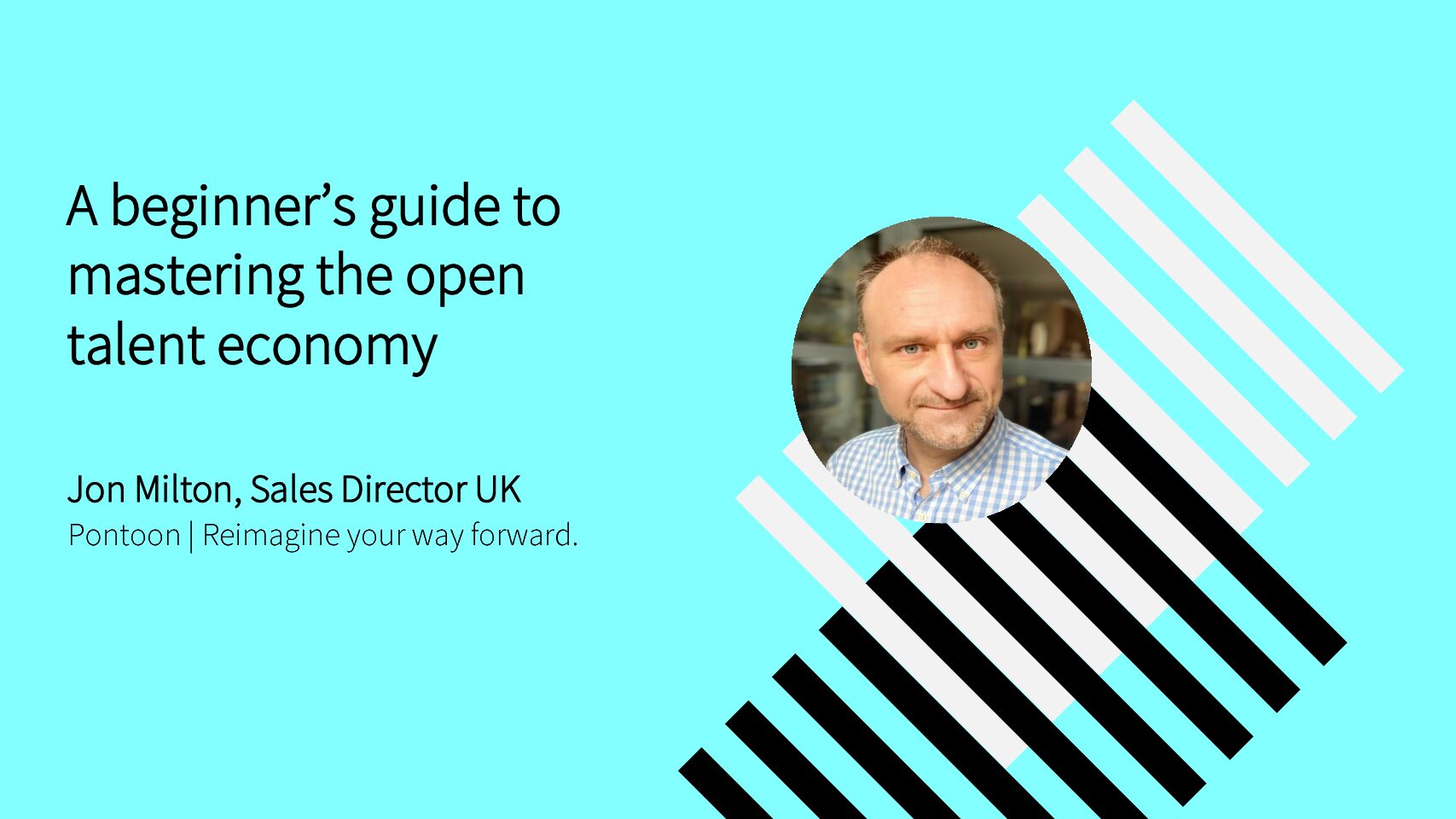Shifting talent ecosystems: Key takeaways from Pontoon Client Summit
During two days of intensive collaboration, we gathered with clients in Nashville, Tennessee, to explore shifts in talent supply and demand, dive into fresh challenges, and find solutions using design thinking. We invited influential MSP and RPO stakeholders – those responsible for making critical strategic talent decisions and their operational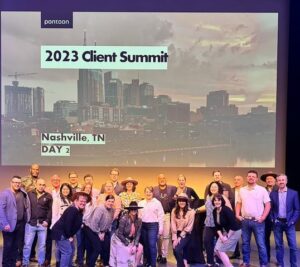 leaders – to ensure we maximised our time together. The goal? To look into the future of talent management over the next five, ten, and twenty years and plan for talent supply and demand shifts that would benefit everyone regardless of worker status – from employees to contingent labour alike.
leaders – to ensure we maximised our time together. The goal? To look into the future of talent management over the next five, ten, and twenty years and plan for talent supply and demand shifts that would benefit everyone regardless of worker status – from employees to contingent labour alike.
We organised Pontoon’s client summit as a platform for meaningful dialogue and exchange. Pontoon acted in its advisory capacity, offering guidance in key talent areas. Through peer-level conversations among colleagues from distinct business sectors, attendees were able to discuss creative solutions for the shifting talent supply and demand while gaining valuable insight into skill development and alternative hiring models – all within a collaborative and fun environment.
Here’s a short recap of our collaborative efforts and key insights spanning two days in Nashville, TN.
Future talent supply and demand shift
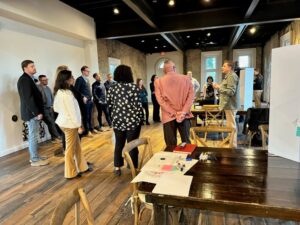 On day one, we embarked on a journey of discovery. After listening to our guest speaker talk about blockchain and how organisations can optimise their talent mix, we began to explore shifting talent ecosystems and the fluctuations in supply and demand that will shape the future of work. Within preselected teams, we delved into various data and geographical indicators – from generational aspirations to government incentives influencing workers’ decisions about where they live and work. We pooled our data sources from several channels before whiteboarding informed predictions about what trends and areas of opportunity lie ahead. By doing so, we explored how best to bridge the gap between currently available resources and those required by organisations in the next five years.
On day one, we embarked on a journey of discovery. After listening to our guest speaker talk about blockchain and how organisations can optimise their talent mix, we began to explore shifting talent ecosystems and the fluctuations in supply and demand that will shape the future of work. Within preselected teams, we delved into various data and geographical indicators – from generational aspirations to government incentives influencing workers’ decisions about where they live and work. We pooled our data sources from several channels before whiteboarding informed predictions about what trends and areas of opportunity lie ahead. By doing so, we explored how best to bridge the gap between currently available resources and those required by organisations in the next five years.
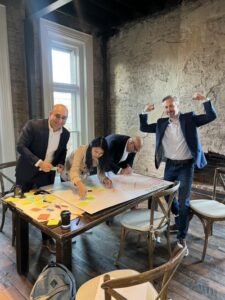 As the world of work evolves, so do our expectations for talent supply and demand. Key insights were shared regarding fair implementation of a four-day work week, and the visible shift away from big cities and traditionally desirable talent hubs to smaller towns and more rural locations due to factors such as quality of life, inflation rates, or even internet speeds – the latter being crucial for providing more flexibility with remote working options. Global worker mobility and “passports” for workers was a hot topic, which might suggest that organisations will have the flexibility to leverage the best talent available regardless of role or industry, enabling workers to move around the world based on the needs of their skills and services.
As the world of work evolves, so do our expectations for talent supply and demand. Key insights were shared regarding fair implementation of a four-day work week, and the visible shift away from big cities and traditionally desirable talent hubs to smaller towns and more rural locations due to factors such as quality of life, inflation rates, or even internet speeds – the latter being crucial for providing more flexibility with remote working options. Global worker mobility and “passports” for workers was a hot topic, which might suggest that organisations will have the flexibility to leverage the best talent available regardless of role or industry, enabling workers to move around the world based on the needs of their skills and services.
Additionally, we agreed that employers must find innovative ways to provide valuable training that strengthens job security rather than just cut jobs entirely when faced with disruption. External influences, including DE&I initiatives in workplaces and sustainability goals, should not be underestimated – both DE&I and ESG have the potential to significantly expand the candidate pools, attract skilled talent, and ensure a diversity of thought necessary for a more equitable and sustainable future.
Skills-based hiring roadmaps
 Day two began with a keynote on the future of skills – and how they could become the new currency. Our activity, hosted at the famous country music venue Grand Ole Opry, gave attendees a chance to continue the skills narrative and tell their own tale within a physical “story box.” The story was built around our challenge of creating a roadmap of actions we could complete in the short/mid/long term to prepare our companies for the future needs of talent supply and demand. The group came up with the idea of creating a global skills portal.
Day two began with a keynote on the future of skills – and how they could become the new currency. Our activity, hosted at the famous country music venue Grand Ole Opry, gave attendees a chance to continue the skills narrative and tell their own tale within a physical “story box.” The story was built around our challenge of creating a roadmap of actions we could complete in the short/mid/long term to prepare our companies for the future needs of talent supply and demand. The group came up with the idea of creating a global skills portal.
As a kind of one-stop shop where you can find everything you need, this portal would provide managers with access to internal and external workers whose skill sets had been pre-vetted and ranked using AI tools. The group agreed that the conceptual skills portal could improve hiring efficiency within organisations while helping to retain essential talent for years.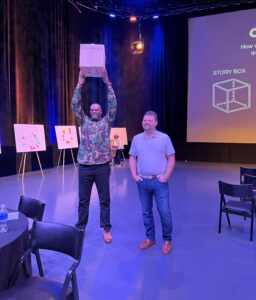
During the exercise, it became evident that taking stock of current resources in terms of personnel and technology is essential. By understanding the type of skills that comprise the future workforce, companies and talent providers can ensure successful long-term growth.
Hear from the attendees
 “It was clear to me that, even though we had multiple clients from different sectors and with different resource needs, we all face the same challenges. Being involved in such diverse conversations helped me focus on what we need to do right now to help us solve our clients’ future needs.” Sam Porter – Senior Account Director – Pontoon
“It was clear to me that, even though we had multiple clients from different sectors and with different resource needs, we all face the same challenges. Being involved in such diverse conversations helped me focus on what we need to do right now to help us solve our clients’ future needs.” Sam Porter – Senior Account Director – Pontoon

“The input from all attendees representing various industries demonstrated the common challenges we face looking to the future. It highlighted the need for flexibility & adaptability and also showed us that we need to be ambitious & creative in our thinking when creating solutions to the challenges we face.” Anne Monaghan – Senior Account Director – Pontoon

“By working together as one entity, forgetting our various industries and roles, we were able to truly collaborate and agree upon the needs of the future of work and various success paths to meet those needs.” Chelsea Rosario – Global Head of Customer Experience – Pontoon
Related Post
The world of work has evolved at an incredible pace over the last twenty-five years. At the start of the 21st century, two critical routes to securing talent and expertise ...



